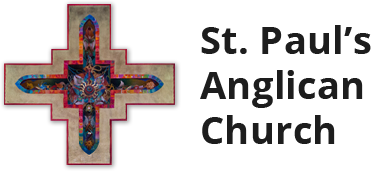Words & phrases used at St. Paul’s
In the Anglican Church, we use some words and phrases that may not be familiar today. We draw on a religious tradition that goes back to the early church. We aim to use these terms in a contemporary context. We hope this brief list of words and their meanings are helpful to you.
- Alb: the basic white vestment worn by the priest and servers.
- Absolution: after we have asked for God’s forgiveness, the bishop or priest prays a prayer that announces God’s forgiveness
- Agnus Dei: From Latin words agnus, meaning “lamb” and dei, meaning “of God.” We say or sing the “Lamb of God” as the bread is broken during the communion service.
- BAS (Book of Alternative Services): One of two prayer books used in the Anglican Church of Canada. This is the contemporary version that has been in use since 1985. The BAS combines resources from the earliest centuries of The Church and those more recently developed in many parts of the Anglican Church.
- Baptism: The service where a new member is welcomed into the body of Christ as a child or adult with promises made about how they will live their lives and grow in their relationship with God. It is always part of a Sunday service or feast day in the church year.
- Chalice: the cup used at the Eucharist which contains the wine.
- Collect: The Collect is a short introductory prayer that brings the people together in thought. It is normally precedes the first inspirational reading.
- Crucifer: A person who carries a cross, leading the procession at the start and the recession at the end of the service.
- Eucharist: the primary act of “thanksgiving,” in which the central beliefs of our Christian faith are celebrated as the church remembers Christ’s saving work on the cross. Another word we use for “Eucharist” is Communion.
- Font: A basin for water to be used in church baptisms. Ours is at the back or main entrance to othe church.
- Oblation: the act of offering the bread and wine for the celebration of Communion.
- Paschal Candle: A very large candle in a very tall holder and placed in a prominent display in the sanctuary or near the font. The candle is lit throughout the Easter season, and during baptisms, weddings, and funerals.
- Priest: Individuals God has called to provide spiritual and sacramental leadership in the life of the church. From the ordination service, the priest is to baptize, preach the Word of God, to celebrate the Eucharist, and to pronounce Absolution and Blessing in God’s Name.
- Processional: The procession by the crucifer, choir and clergy from the back of the church to the front at the start of a service.
- Recessional: The recessing by the crucifer, choir, and clergy from the front of the church to the back at the end of a service.
- Sacraments: “outward and visible signs of inward and spiritual grace.” Sacraments are physical actions that point us to deeper realities than we are able to experience with our five senses. The Anglican Church recognizes two major, or “gospel” sacraments, and five minor sacraments, or sacramental acts. The two major sacraments, Baptism and Communion, and called gospel sacraments because Jesus told us (in the gospels) to do them until he comes again. The five sacramental acts (or minor sacraments) are not all necessarily required of all Christians. They are Confirmation, Marriage, Ordination, Reconciliation, and Unction.
- Stole: the liturgical vestment worn by bishops, priests and deacons. Bishops and priests wear it around the neck and the shoulder; deacons wear it over the left shoulder.
- Vestments: the clothing worn by persons leading the worship service.


